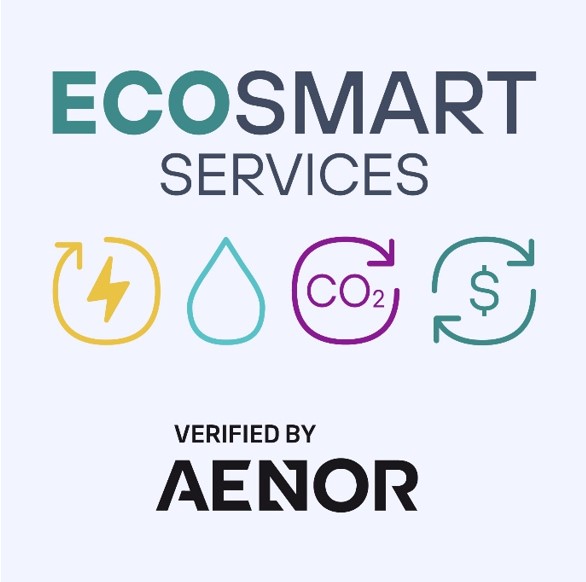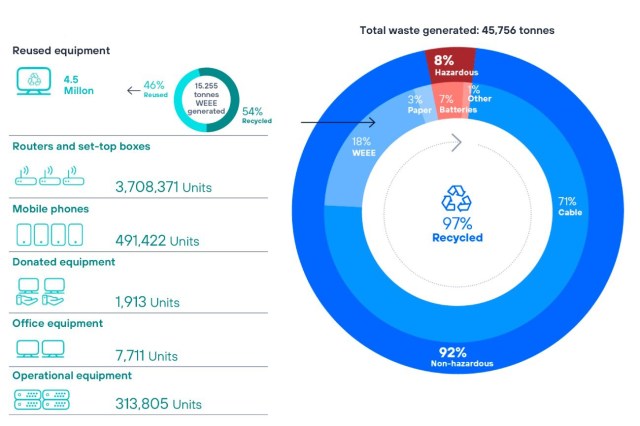Telecommunication networks and digitalisation are key tools for becoming more efficient, tackling environmental challenges such as climate change and accelerate the green transition.
In order to minimise our environmental footprint and become more efficient, the Telefónica Group’s main environmental targets are to:
- Achieve net zero emissions by 2040, including our value chain. To achieve them, we will reduce all our emissions by at least 90% and neutralise the remaining emissions through nature-based solutions.
- Consume 100% renewable electricity in all our markets by 2030.
We also want to help our customers become more sustainable, through our connectivity and Eco Smart solutions. This will also allow us to build their loyalty and enable us to grow.
Road to Net Zero
Our Telefónica climate targets are validated by the Science Based Targets initiative and include Scopes 1, 2 and 3, or in other words carbon emissions linked to our operations and the entire value chain.
In our Climate Action Plan we set out our roadmap, taking into account the impacts, risks (analysed according to the Task Force on Climate-Related Financial Disclosures, or TCFD) and opportunities presented by the green transition.
Furthermore, in Europe, Brazil, Peru and Chile, 100% of the electricity we consume at our own facilities comes from renewable sources (84% globally).

As a result, we have reduced our emissions (Scopes 1+2+3) by 51% over the last eight years, according to our assessment under the GHG Protocol standard.
As a result, we have reduced our emissions (Scopes 1+2+3) by 51% over the last eight years, according to our assessment under the GHG Protocol standard
Around 85% of the Telefónica Group’s emissions are Scope 3, i.e. they are produced across our value chain. Of these emissions, 64% come from the purchases we make from our supply chain.
In 2023, our Scope 3 emissions decreased by 31% compared to 2016 (base year). In order to keep reducing them, we must work together with our suppliers as well as with other companies in the sector.
This is why we stepped up our engagement efforts over the past year. We also asked our most significant suppliers in terms of emissions to commit to science based emission reduction targets validated by the Science Based Targets initiative.

We have been offsetting the impact of our emissions for several years through nature-based projects that generate high quality carbon credits.
By 2025, we aim to neutralise 100% of the residual emissions from Scopes 1 and 2 in Spain, Germany and Brazil each year. In 2023, this stood at 65% and the global figure was 10%.
In Spain we have obtained credits from “Bosque Telefónica” forestry project, as well as from a project protecting forests in the Amazon Biome and another restoration project in Galicia.
In Brazil, we continue to offset 100% of Scope 1 and 2 emissions through the purchase of carbon credits for local initiatives that prevent deforestation and encourage reforestation.
In Germany we have neutralised 60% of our operational emissions through a reforestation project in Colombia.
Additionally, Telefónica S.A. has offset 68% of the impact of Scope 1 and 2 emissions from its corporate buildings through projects in Spain and Colombia.

Organisations such as the World Economic Forum and the Exponential Roadmap initiative state that digital technologies can help reduce global greenhouse gas emissions by 15% by 2030 when implementing solutions in industrial sectors, and up to 35% if we consider their ability to transform people’s habits.
At Telefónica we develop green digital solutions to help our customers in their transition towards more sustainable and competitive business models. We therefore reap the benefits of connectivity (fibre and 5G are more energy efficient), the Internet of Things (IoT), cloud, big data and Artificial Intelligence (AI).

In order to help decarbonise other companies and sectors, we have the Eco Smart label to identify the environmental benefits of services, such as energy savings, reduced water consumption and CO2 emissions and the promotion of the circular economy.
Telefónica is making progress towards becoming a zero waste company. The circular economy allows us to grow using fewer resources and avoid indirect carbon emissions caused by the manufacture of new equipment.
For input materials, therefore, we have initiatives and targets that reduce material extraction by increasing the circularity of products, incorporating durability, repairability or recyclability from design and increasing equipment use cycles through reuse.
- Refurbish and reuse 90% of routers and decoders collected from customers in 2024.
- Introduce circularity criteria in purchases of customer electronic equipment in 2025.
- Incorporate environmental criteria in household connectivity equipment designed by Telefónica from 2025 onwards.
- Incorporate environmental criteria in household connectivity equipment designed by Telefónica from 2025 onwards.

In terms of output materials, our philosophy is that there is no waste, only misplaced resources. Therefore, we aim to facilitate the return of end-of-life materials through refurbishment and recycling. These targets are aligned with the sectoral goals of the GSMA:
- Collect at least 20% of the mobile phones distributed to end customers by 2030. Reuse, resell and recycle 100% by 2030.
- Network equipment: reuse, resell and recycle 100% by 2025.
- Zero waste: reuse and recycle 100% of the total waste generated (hazardous and non-hazardous) by 2030.

There are projects that are helping us, for example, to make improvements to network equipment. The MAIA digital platform allows them to be reused internally or to connect with technology partners to facilitate the sale of this equipment and extend its useful life.
In the last year, we have reused over four million pieces of electronic equipment and recycled 97% of our waste
ESG Report 2023
Summary of the Company’s mission, strategy and progress in economic, environmental, social and governance matters.


